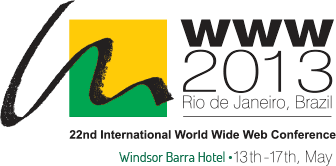A workshop at the WWW 2013 conference in Rio de Janeiro, Brazil
This workshop proposes to derive the characterisation of social systems on the Web as “social machines”, computational entities governed by both computational and social processes. The purpose of such a model is to enable the effective identification and interrogation of the components, processes, properties and limits of such systems, in particular that enable them to solve complex social and computational problems in a decentralized fashion, at large scale. The objective of this workshop is to bring together experts of various kinds of online social systems, including crowd-powered systems, social networks, and online communities, to jointly refine the model and apply it to the study and design of new kinds of social systems.
Topics
The significance of the Turing machine for classical computation stemmed from its establishing a common model through which the limits and properties of computation could be effectively interrogated. Sixty-four years after this model was proposed, we now witness new kinds of “machines” governed not purely by computational processes, but by collective social processes resulting from the amalgam of individual action and coordination, mediated and enabled by the shared communication substrate of the Web.
This workshop proposes to investigate whether a similar model could be derived for the purposes of interrogating the properties and limits of the social systems enabled by the Web. By studying the breadth of Web-based social systems through a single, unifying lens, inclusive of online communities, social networks, and “human-powered”, crowd-sourced, -moderated and -curated systems, this workshop will seek to address the following kinds of questions: what are the governing properties, characteristics, scopes and capabilities of these new “social machines”? What are the constructs that differentiate their function and operation? How have the design of these systems evolved and grown to support or contradict community appropriation? What are the social and computational “primitives” of a social machine, and what are appropriate methods that can be applied to study and predict the behaviour of such systems? Finally, how do the characteristics the behaviour of social machines relate to the needs of societies as a whole?
The theme of this workshop derives from concepts introduced by Tim Berners-Lee in Weaving the Web, where the Web was described as engine to “create abstract social machines – new forms of social processes that would be given to the world at large”, and serves as the focus of and a new joint Research Programme Grant funded by the EPSRC[1].
Objectives
The objectives of this workshop are to leverage the expertise brought by workshop participants towards understanding the use and application of social machines as a model. Examples of research questions and areas that we wish to understand include:
- Describing social machines - What are the constructs (dimensions/characteristics) that describe and differentiate current social machines when viewed as a collective?
- Socio-cognitive-computational primitives of social machines - Can the operation, function and output of social machines be described or identified in terms of a finite set of “social primitives” comprised of both computational and social functions?
- Evolution and adaptation - what forces govern the birth, evolution and demise of social machines? How do users adapt and appropriate platforms and substrates to better support social computation?
- Management structures - How do the management structures of different social machines affect their function and meet their purposes? Are bottom-up (grass-roots) driven social machines characteristically different from top-down (mechanical turk style)
- Machines and substrates - Do “general” social networking sites (such as Facebook, reddit, Twitter) evolve into social machines when faced with a crisis or a purpose?
- SOCM2013: The Theory and Practice of Social Machines (#socm2013)
